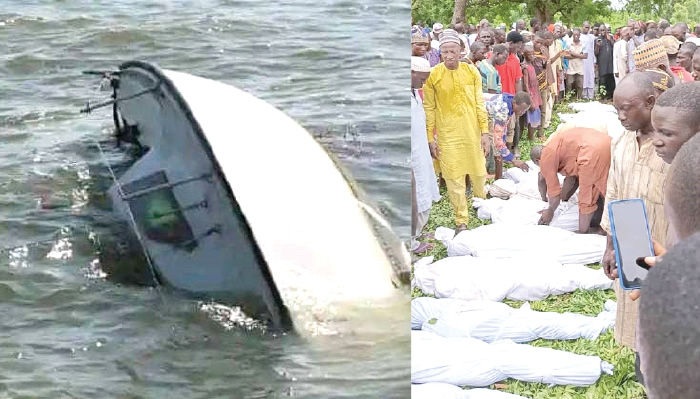
Many communities in Niger, Adamawa, Kebbi and other states where water is a major means of transportation have recorded boat accidents that led to deaths and unaccounted persons, CHIKA OTUCHIKERE writes on this challenge and the way forward
When did boat accidents start in northern states?” our correspondent asked the spokesperson for the Niger State Emergency Management Agency, Hussain Ibrahim.
After a brief silence, he said, “Well, I’m sure these accidents started before I was born, because our people have been commuting on waterways as a means of transportation long before I was born.”
According to him, the spate of boat accidents was unfortunate.
Indeed, while it’s difficult to say exactly when the first boat accident was recorded in the country, it is clear however that from the North to the South, many lives have been lost while some remain unaccounted, sadly.
On May 26, 2021, for example, what could pass for a national tragedy occurred in Niger State when more than 150 persons reportedly lost their lives to an accident. The boat, later found to have been overloaded, had between 150 and 200 passengers on board when it departed from Lokon Village in Minna, Niger State, for Warrah Market in Kebbi State.
The boat was said to have hit an object inside the river around 8:15 am. Sadly, the severity of the impact caused the boat to break into two and sink. According to reports, the passengers were mostly women and children, travelling to Warrah to sell food items in the market. It also had some miners on board.
The exact number of passengers could not be ascertained because the boat was said to have picked passengers along the way. However, it was later gathered that the boat was an old, rickety, wooden boat with a capacity of between 80 and 150 passengers.
In addition to being overloaded with passengers, reports said the boat also carried sandbags. When it capsized, only about 26 persons were said to have been rescued alive while search and rescue operation only led to the discovery of 76 bodies. The rest of the passengers were declared missing.
Despite the articulated condolence messages and proposed action plans that often greet the accidents, they have yet to abate.
On June 13, 2023, no fewer than 150 persons were confirmed dead when a boat carrying passengers returning from a wedding party capsized. The passengers were said to be going from Niger State to Kwara State when the incident happened. The cause of the accident was unknown, but many others went missing apart from those who died.
Less than a month earlier, no fewer than 15 girls were reported dead in Sokoto State after a fatal boat accident at Dandeji village in the Shagari Local Government Area of the state.
The girls were said to have been on their way to a nearby bush to fetch firewood when the boat, carrying over 40 girls, capsized.
In fact, a compilation by Saturday PUNCH as reported on July 1, 2023 indicated that boat accidents caused by head-on collisions, speeding and overloading claimed no fewer than 3,133 lives between January 2013 and June 2023.
The report also showed that Niger, Rivers and Bayelsa states have the highest number of accidents, while in coastal Rivers and Bayelsa states, there were over 557 deaths, with over 112 unaccounted for, as their bodies were never recovered.
In Niger State, from 2013 to date, there were about 24 boat accidents, which led to the death of over 332 persons, including women and children.
A document from the Niger State Emergency Management Agency office shows that in the last four weeks, 53 persons drowned in six different boat accidents in four local government areas of Shiroro, Mokwa, Agwara and Borgu. It added that the victims were made up of more women and children.
According to the document, Mokwa had the highest, with 30 deaths, followed by Borgu, 10, Agwara, eight and Shiroro, five. It is instructive to note that these were the bodies recovered, excluding those that were not recovered.
Adamawa State also has a similar sad story, with three boat accidents in eight days, claiming the lives of over a dozen persons.
Specifically, on September 4, a canoe travelling between Mayo-Ine and Mayobelwa in Mayobelwa LGA floundered, killing two of its passengers. Four days later, another one occurred, involving a canoe conveying 23 traders and farmers from Rugange village to Yola town via the Njuwa Lake at Dandu village. In the accident, 15 people reportedly drowned.
As if that was not enough, three days later as rescue workers were struggling to recover the corpses of missing persons from the Njuwa Lake, another boat with dozens of passengers was said to have capsized following a strong wind in Gurin, Fufore LGA. Local divers reportedly rescued 11 persons while many more could not be accounted for.
Unveiling the cause of the accidents
The Adamawa State Emergency Management Agency boss, Muhammad Sulaiman, listed overloading, disregard for bad weather and non-usage of life jackets as factors responsible for the accidents. He however said the government was working to enforce safety measures to prevent recurrence.
Governor Ahmadu Fintiri had also ordered all relevant agencies to enforce safety standards, including placing a ban on overloading and ensuring the use of life jackets on the waterways. He further called on traditional rulers and local government councils to support his administration in preventing further loss of lives due to negligence and disregard for safety rules.
He stated, “I want to draw attention to the dangers of using a canoe without life jackets or those who travel without an engine to drive it, especially during storms or downpours. We should know life is better than money. I direct all relevant agencies to regulate water transportation.
“We will provide life jackets at every point where people are transported. Traditional rulers should ensure that a canoe with the capacity to accommodate 10 persons is restricted to only 10 persons. What we saw in Rugange and Gurin is enough to serve as a lesson to us. We will not wait to come for condolence after loss of life. We will prevent it without fear or favour.”
Meanwhile, a former fisherman and boat driver in the state, Danlami Adahnu, identified greed on the part of transporters as a major cause of the frequent accidents on the waterways.
He stressed that during storms, a wise skipper would reduce the number of passengers below the boat’s capacity, to avoid capsizing. “The best way to prevent accidents is to avoid overloading, because during the rainy season, water waves are strong and very fast, so a wise canoe man (skipper) would reduce the number of passengers even below the capacity of the canoe to avoid capsizing,” he said.
Also, speaking about the cause of the May 2021 tragedy, the Director-General, NSEMA, Salihu Garba, said the accident was due to water hyacinth and heavy wind.
Way out
Asked what could be done to stem the tide of boat accidents, NSEMA spokesman, Ibrahim, said improved enforcement of safety guidelines and provision of support and intervention by the government were necessary.
He stated, “Strict monitoring, enforcement of regulations, providing safety measures for people and providing assistance for them to help them construct new canoes.
“Some of the canoes are very small, some are old and some are rickety. Some of the operators also don’t have money. Government should put them into cooperatives and provide funds for them to put into their businesses which they will refund to the government.
“That is part of what government should do; by also providing more modern canoes and giving to them at subsidised rates; giving them more life jackets at subsidised rates; ensuring more officials of the Inland Waterways monitor the operators; Search and Rescue officials should be on the alert so that if anything untoward happens at any time, they can respond quickly to save lives.”
Reacting to reports that a former Niger State governor bought ferries for them and that they were misused, he stated, “The ferries were in just three places. We have one in Pateji, one in Agwara and one in Lafiaji. We have 579 communities in the riverine areas and the location the ferries are is not up to five locations.
“So, what happens in those places where they are using water as their means of transportation? There should be more ferries. Government should encourage them by providing them with soft loans or constructing canoes and giving to them at subsidised rates, including life jackets.
These, he said, were the only ways to solve the problems, adding, “You ask them to buy new canoes, but they don’t have the money. Some people even find it difficult to eat. Some of the vehicles on our roads are also not roadworthy, likewise the roads. So, what is happening in the waterways sector is still happening on the roads.”
He called on the government to show more interest in public transportation and not leave it to individuals, who might be driven by profits.
He noted that new persons had been recruited based on the recent disaster, including local divers and boat owners, to serve as waterways disaster response guard. He said they would be trained and equipped and that safety rules would be enforced.
“These people will be posted to the different water boarding points across the state for enforcement of safety regulations and search and rescue operations, which are the ways we intend to reduce boat accidents,” he added.
The state’s Commissioner for Information, Binta Mammam, told Saturday PUNCH in an interview that the government was working to reduce boat accidents in the state through the provision of life jackets, increased awareness and enforcement of safety rules.
She noted that relief materials had been provided for victims of previous accidents while life jackets were provided for the people.
She lamented that in Mokwa and Agwara, life jackets were provided for the people, in addition to enlightenment on the need to use them, but that people don’t use them. “At Mokwa and Agwara, life jackets were sent earlier but the problem is that these people don’t use the life jackets, and sometimes there is negligence from owners of the boat,” she added.
“A boat that is supposed to take 10 or 15 passengers will sometimes end up taking up to 50 passengers. Those are the challenges we face, but we pray that with the sensitisation, the accidents will reduce.
“If the passengers have life jackets on and any incident happens, at least a call will be put through for help, and before anyone drowns help would have arrived. But if you don’t use a life jacket, there will be no chances of survival.”
She stressed that while the government was available to intervene, overloading, use of boats in bad shape would no longer be tolerated.
“There are times when many boats overload and still carry motorcycles, animals and other heavy loads. I think the security agencies will now come to guide them against this. I don’t understand why people keep repeating the same things that have caused accidents year in, year out. The sensitisation will continue until we get it right, Mammam added.




